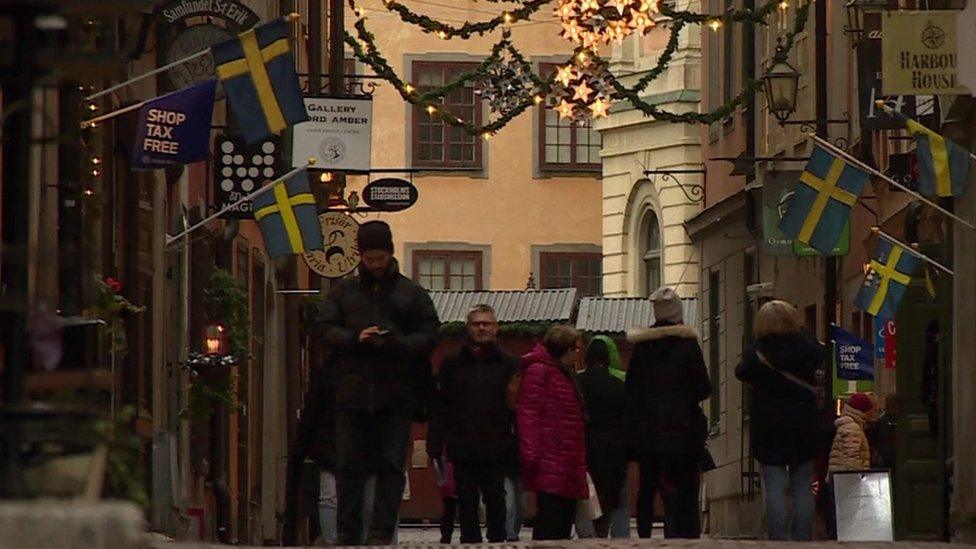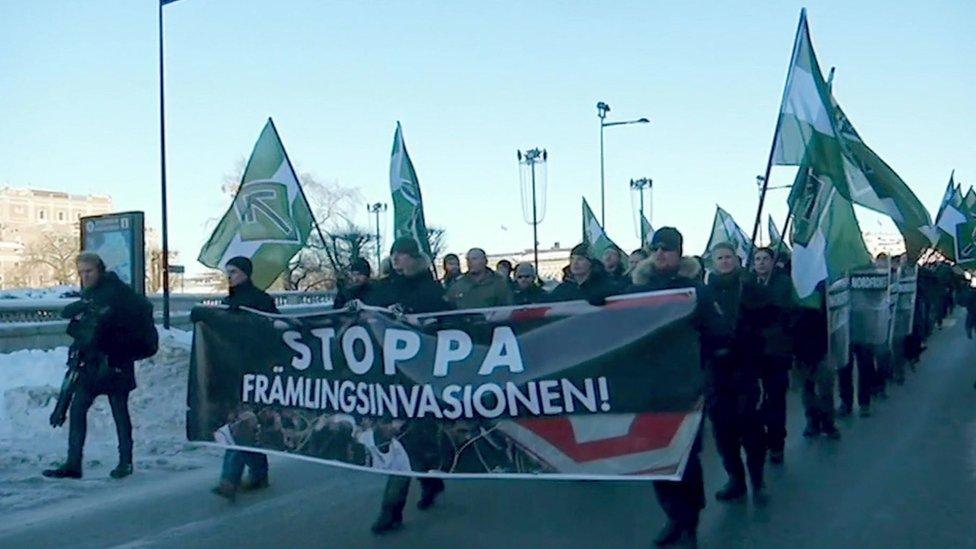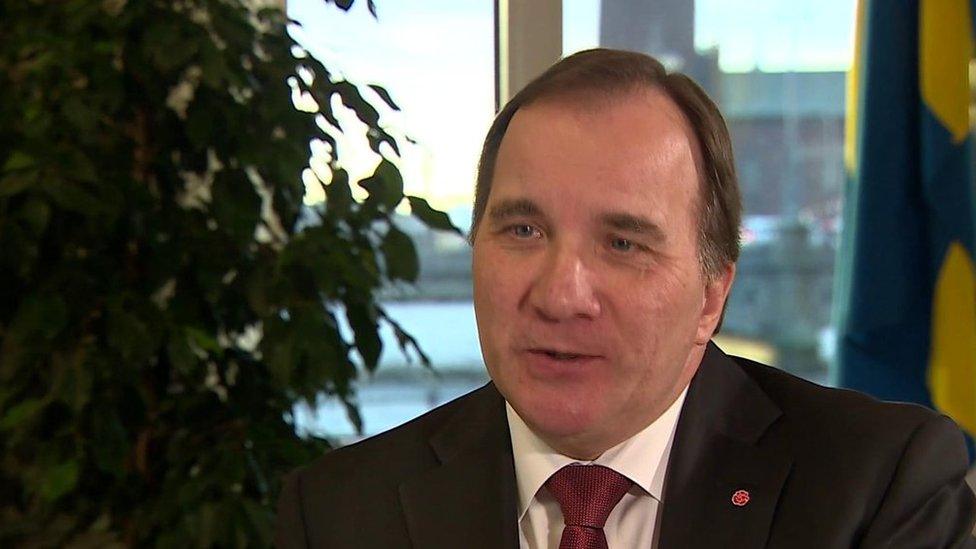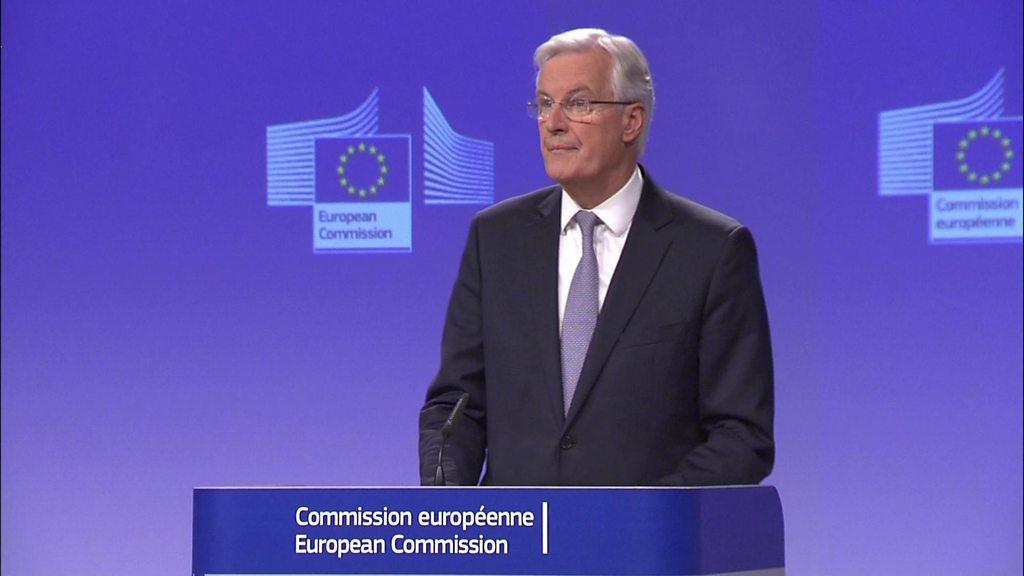EU leaders sing from same Brexit hymn sheet
- Published
Stefan Lofven said he was confident moves for a Swedish exit would not follow
It's a twitchy, tetchy time this pre-Brexit talks, post-Brexit vote period.
So much said. So little known.
As Europe editor I'm often asked about the EU point of view - but Europe is waiting first and foremost to get a clear idea from Britain as to what kind of Brexit the government definitely wants.
In the meantime, one message alone emanates loud and clear from European capitals and Brussels HQ, centred round an idiom that will forever now be Brexit-linked in my mind.
The words "cherry picking" popped out of German Chancellor Angela Merkel's mouth just last week, the same day they were intoned, with charming French accent, by Michel Barnier, the European Commission's Brexit negotiator.

Like the UK, Sweden is business-minded, Brussels-sceptic and a non-eurozone nation
The mantra is that the UK (despite protestations to the contrary by the British foreign secretary) will NOT be allowed to break EU regulations by staying in the European single market while refusing to accept "freedom of movement" - the automatic right of EU citizens to live and work in the UK.
"There is no organisation in the world that will let someone say: 'I will follow this rule of yours but I won't follow that one'," Swedish Prime Minister Stefan Lofven told me when I interviewed him just now in Stockholm, ahead of an EU leaders' summit.
Cherry-picking is körsbärsplockning in Swedish, by the way.
And Mr Lofven said Britain definitely wouldn't be allowed to indulge in it when talks to thrash out a new EU-UK trade deal begin.
Raw self-interest
Sweden is one of the UK's closest EU allies: it is business-minded, Brussels-sceptic and non-eurozone nations.
Britain is also Sweden's fourth largest trading partner, so a good Brexit deal is in its interest.
So, was there really no wiggle room, I asked. Couldn't the Swedish prime minister push for a favourable deal?
Mr Lofven said he had offered Theresa May to act as a mediator - "play a practical role" as he put it - but, he insisted, the UK would still have to aim for the best deal possible within the boundaries of EU laws.
Otherwise, he said, there would be no European Union, as other countries would head for the exit door too, preferring their own bespoke EU arrangement.
And that is at the heart of European leaders' cherry-picking hymn sheet: not EU-fervour but raw self-interest.
Swexit?
Trade-dependent Sweden relies to a large extent on the European single market.
So, of course, does economic giant Germany.
And that is the flaw in the Brexiteer argument that German car manufacturers will lobby until the end for a good UK trade deal.
One in five German cars is sold in Britain, so of course the industry wants a decent deal, but, more than that, it hopes to avoid the lucrative single market being damaged and bleeding out more members.

Swedish neo-Nazis recently held their biggest march in Stockholm since WW2
Did Mr Lofven worry about demands for a Swexit in traditionally Eurosceptic Sweden, I wondered?
He didn't, he said, although the popular and populist Sweden Democrats Party, wants to make an EU referendum a central part of its 2018 general election campaign.
But Mr Lofven did admit to being very worried about growing anti-establishment sentiment in Sweden as elsewhere in Europe.
Newly confident Swedish neo-Nazis took to the streets of Stockholm recently in their biggest demonstration since World War Two - inspired, they said, by the election victory of Donald Trump.
Support for the far-right Sweden Democrats, meanwhile, has soared since the EU migrant crisis.
Sweden received more asylum seekers per capita than any other EU country, including Germany in 2015.
Many Swedes are still angry with their government and the EU for "leaving them alone" to deal with the huge influx of arrivals.
But Mr Lofven, a traditional social democrat, insists he has the answer: a fairer society.
He and other centre-left European leaders have now formed a loose association (they met in Vienna last week) in an attempt to counteract the populist wave.
The gap between rich and poor had grown too wide for too long in Sweden. It was dangerous, he told me.
He said the EU was guilty of being too market-oriented and that he was pushing hard for a more social-minded Sweden and EU to be able to say to voters: "You have a future; you have possibilities. We're not all about financial markets. This is about you."
At their summit this Thursday EU leaders will try to reassure one another that they can stand strong against populism and the Brexit Blues but it's going to be one hell of a challenge.
- Published13 December 2016

- Published30 December 2020

- Published6 December 2016

